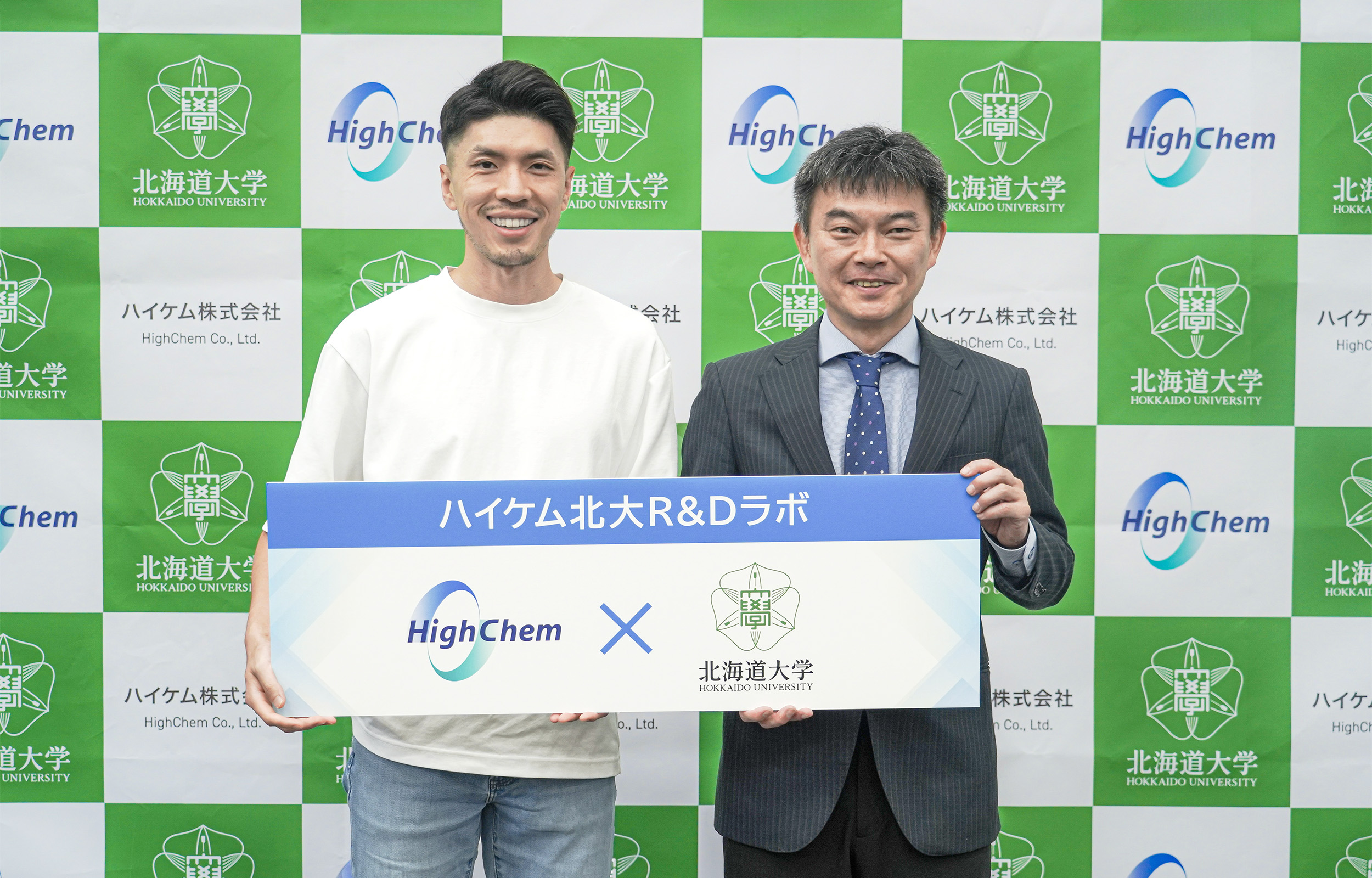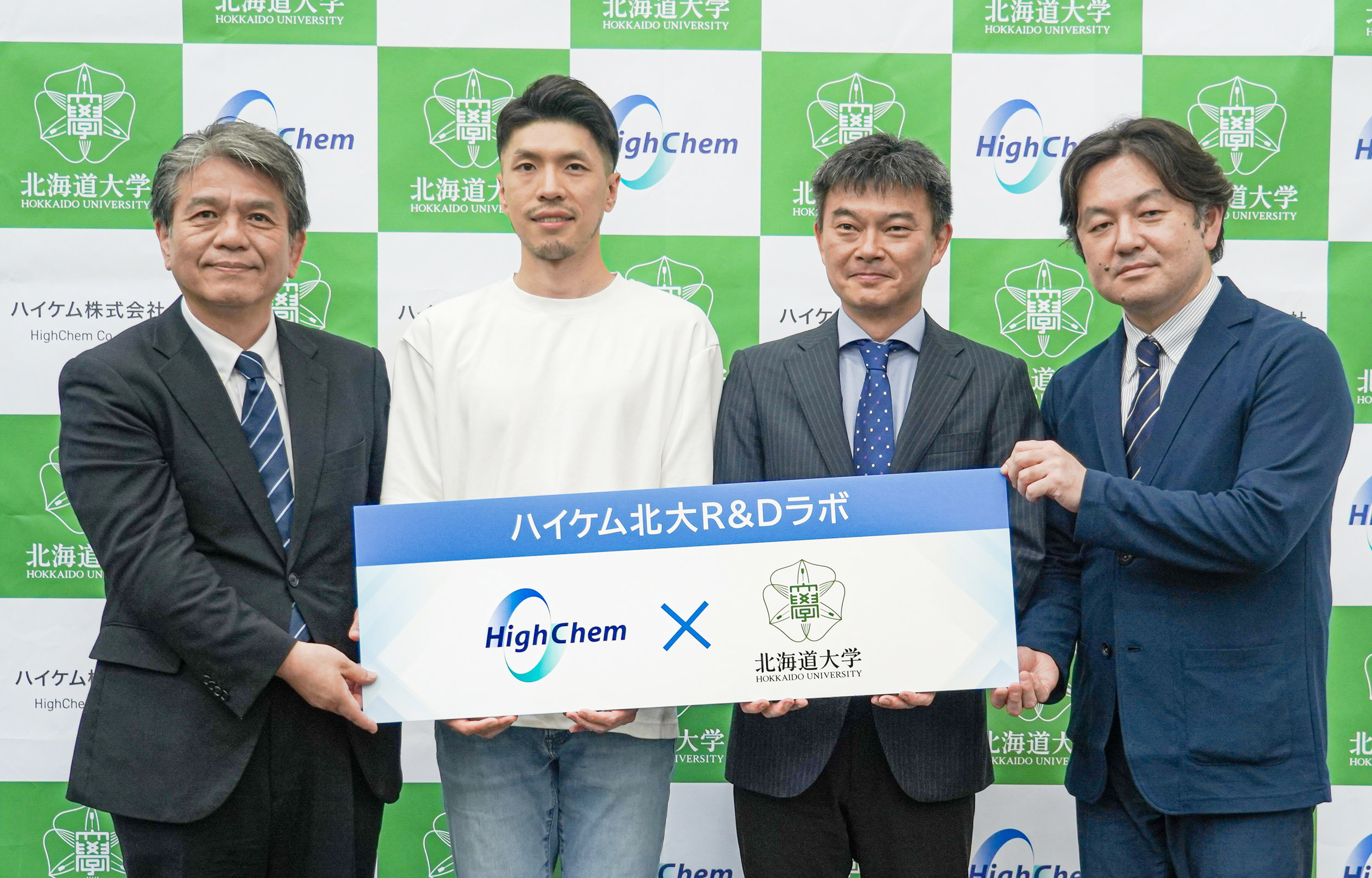 左から:ハイケム(株)取締役 高裕一、北海道大学 触媒科学研究所 所長 清水研一
左から:ハイケム(株)取締役 高裕一、北海道大学 触媒科学研究所 所長 清水研一
ハイケム株式会社(本社:東京都港区 代表取締役社長:高潮(たか うしお)、以下ハイケム)と北海道大学(所在地:北海道札幌市、総長:寳金清博)とは、石油資源に依存しない未来のペットボトルや繊維の早期の実用化と普及に向け、バイオマス(植物由来)の資源化技術の共同研究を行う、産業創出講座「ハイケム北大R&Dラボ」を設立しました。北海道大学が、最先端技術であるバイオマスの資源化技術について、研究成果の実用化・普及に向けて民間企業と共同研究を行うのは画期的な試みとなります。
北海道大学が保有する触媒プロセス技術に関する学術的知見と、ハイケムがこれまで培ってきた環境分野における原料の調達、触媒や素材の工業化技術を融合して研究を進め、早期に事業展開を図ることで、化石資源に依存しないグリーンな化学品及び樹脂の実用化に貢献してまいります。
ハイケム北大R&Dラボ概要
目的:化石由来合成樹脂・繊維を代替えするバイオマス由来物質の開発
期間:2024年4月1日~2026年3月31日まで
所在地:北海道大学 触媒科学研究所
研究統括:中島清隆教授(北海道大学 触媒科学研究所)
進まないペットボトルや繊維の環境対応
ペットボトルや繊維の材料となるポリエチレンテレフタート(PET)は、世界で約8,000万トン生産されています。PETは石油などの化石資源を原料としており、CO2排出量などの環境負荷が高くなる他、石油の枯渇や石油価格の高騰などの課題を抱えています。これらの課題を解決するためにも、従来の石油資源を用いたPETに代わる、ボトルや繊維の早期の実用化が求められていますが、まだ多くの開発技術が一般的な普及には至っていないのが現状です。
バイオマスの最先端技術を持つ北海道大学と実用化実績を持つハイケムがタッグ
北海道大学の触媒科学研究所では、バイオマス(植物由来)からプラスチック原料への触媒変換反応において、国内でも最先端の技術開発を行っています。今般、トウモロコシ由来の生分解性プラスチック・繊維の商品化や、一酸化炭素由来のエチレングリコール(PETの原料)を実用化に結び付けた実績を持つハイケムと北海道大学が共同開発を進めることで、未来のペットボトルや繊維の早期実用化を目指します。
新たなバイオマスポリエステルの開発と実用化を目指す
今般の北海道大学との共同研究においては、ハイケムが調達するバイオマス原料の超高効率で超高選択的な糖化プロセスや樹脂原料への誘導化プロセスの開発を進めるとともに、PET(ポリエチレンテレフタレート)の代替として注目を集める、新たなバイオマス(植物由来)ポリエステルの新規重合手法の開発に取り組みます。これらの技術確立により、社会的要請となるCO2排出量や化石資源の使用削減に資する、グリーンな化学品及び樹脂の実用化に貢献してまいります。
ハイケムの環境分野技術の実用化と普及の実績について
ハイケムは2019年よりポリ乳酸(PLA)の世界最大のメーカー豊原集団と事業戦略パートナーシップ契約を締結し、PLAを始めとする生分解性材料やバイオ材料の日本市場の開拓を行っています。また、2021年にはトウモロコシ由来の新しいPLA繊維として自社ブランド「HIGHLACT®(ハイラクト®)」を発表しました。欧米での営業活動を活発化させており、ポリエステルの代替としてのPLA繊維のグローバルな普及に努めています。
またハイケムでは、PETの原料となるエチレングリコールを非石油由来で製造するSEG®技術の実用化に取り組んでいます。中国のエチレングリコール需要の半分以上となる約1,000万トン/年のライセンス契約を締結し、600万トン/年以上が商業運転を開始し、大量生産による普及を実現しています。
更に、カーボンリサイクルにつながる、CO2由来の繊維の開発にも取り組んでいます。2020年にはNEDOのプロジェクトとして、CO2を原料とするパラキシレン製造に関する開発に着手しており、ハイケムは、当研究の触媒開発を担っています。またポリエステルのもう一つの原料となるエチレングリコールについては、ハイケムが保有するSEG®技術をベースに、CO2由来のグリーンSEG®の商業化に取り組んでいます。
 左から:ハイケム東京研究所 所長 青島敬之、ハイケム(株)取締役 高裕一
左から:ハイケム東京研究所 所長 青島敬之、ハイケム(株)取締役 高裕一
北海道大学 触媒科学研究所 所長 清水研一、北海道大学 触媒科学研究所 教授 中島清隆
ハイケム株式会社 概要
サステナブルな素材開発などの革新的な技術力とその実用化のノウハウを有する日本の化学メーカー。近年ではトウモロコシ由来の生分解性プラスチック繊維を開発し、国内でSHIPSなどの有名ブランドに素材が採用される他、欧米のブランドや生地メーカーからも高い評価を得ている。また、素材を一酸化炭素から製造する技術については実用化に加え、大量生産による普及を実現させている。高い技術力により年間の売上高は1,239億円(2023年度:対前年22%増)と着実な成長を続けている。
会社名:ハイケム株式会社(https://highchem.co.jp/)
所在地:東京都港区虎ノ門1丁目3番1号 東京虎ノ門グローバルスクエア11階
代表取締役:高潮(たか うしお)
事業概要:化学品の輸出入販売・受委託製造/技術ライセンス関連業務/触媒製造販売/生分解性材料販売等
北海道大学 触媒科学研究所 概要
国立大学法人 北海道大学 触媒科学研究所について
触媒科学に関する研究を行い、かつ、国立大学の教員その他の者でこの分野の研究に従事するものの利用に供することを目的とする。1943年に触媒研究所として設立し、1989年に触媒化学研究センター、2015年に触媒科学研究所に改組し、今日に至る。2010年には文部科学省の共同利用・共同研究拠点に認定された。革新的触媒の開発と学理追究を担う基礎研究系8部門、研究成果の実用化および産業界ニーズの技術シーズ化を担う開発系1部門が基盤的研究開発を推進する。
北海道大学 触媒科学研究所 中島清隆教授
【経歴】
2006年3月 東京工業大学大学院総合理工学研究科物質電子化学専攻博士後期課程修了(博士(理学))。
東京工業大学応用セラミック研究所 特任助教や株式会社豊田中央研究所 客員研究員を経て、2015年に北海道大学触媒化学研究センター 准教授となり、2022年4月から現職。
【研究概要】
1. 選択的糖変換のための固体酸塩基触媒の創生
2. バイオマス由来フラン類からのポリマー原料合成
3. 表面分光分析と理論計算を活用した触媒表面での反応ダイナミクスの解明

【このリリースに関する報道機関からのお問い合わせ】
ハイケム株式会社 広報室 担当:黒岩(090-6539-4213)・陳
TEL:03-5251-8580 E-mail:koho@highchem.co.jp
国立大学法人北海道大学 触媒科学研究所 教授 中島清隆
TEL:011-706-9132 E-mail:nakajima@cat.hokudai.ac.jp
(配信元)国立大学法人北海道大学 社会共創部広報課
TEL:011-706-2610 E-mail:jp-press@general.hokudai.ac.jp
